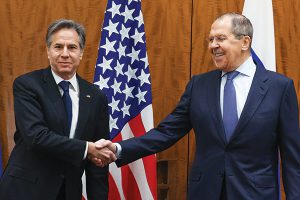Bloomberg
The European Union will snub a request by Russian Foreign Minister Sergei Lavrov for the bloc’s member countries to respond individually to Moscow’s demands on the region’s security framework.
Josep Borrell, the bloc’s foreign policy chief, will respond on behalf of the 27 EU members, according to a draft of the letter seen by Bloomberg. The EU response has been closely coordinated with the North Atlantic Treaty Organization, which will send its own similar letter, according to diplomats who asked not to be identified because the process is private.
“Further to your recent letter addressed to the foreign ministers of the 27 member states of the European Union, I am writing to convey the following on our collective behalf,†Borrell is expected to write in a letter to be sent as soon as Wednesday. “Together with our partners in Nato, we in the European Union are prepared to continue dialog with Russia on ways to strengthen the security of all.â€
The draft, which could yet change, says that questions of European security should be addressed at the Organization for Security and Co-operation in Europe, and discussed in other forums such as the Nato-Russia Council.
The letter comes as Western allies are seeking to project a show of unity toward Russia, bolstering Nato’s eastern flank with added troops and threatening joint sanctions against Moscow if it were to invade Ukraine. Russia says it has no intention to invade, even as it has positioned around 130,000 troops at Ukraine’s border, according to the US and UK.
‘National Capacity’
A spokesman for Borrell declined to comment on the letter.
In letters sent last month to the foreign affairs chiefs of the US, Canada and several European countries, Lavrov asked for their interpretations on the principle of indivisible security, a concept in international treaties that states that defense should be viewed collectively and no individual country should strengthen their security in ways that threatens others.
“We also expect that the response to this letter will be given in the national capacity, as the aforementioned commitments were undertaken by each of our states individually and not within any bloc or in the name thereof,†Lavrov wrote.
Speaking in Washington, Borrell said the EU was working on a common answer to Lavrov. “He cannot expect to have different answers from the 27 and it will be a good occasion to show European unity and maybe the fact that we are not 27 different countries, but a union — something that the Russians don’t like to accept,†Borrell said.
 The Gulf Time Newspaper One of the finest business newspapers in the UAE brought to you by our professional writers and editors.
The Gulf Time Newspaper One of the finest business newspapers in the UAE brought to you by our professional writers and editors.
